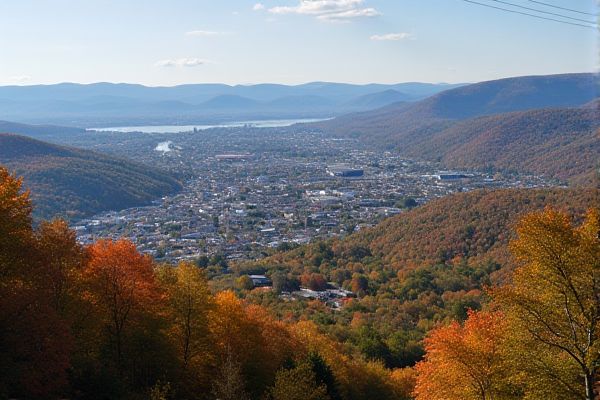
Insights from New Hampshire residents and expatriate communities: Climate: Prepare for cold winters. Stunning natural landscapes. Low crime rates. High-quality education system. No income or sales tax. Vibrant local culture. Cost of living varies. Strong community involvement. Limited public transportation. Emphasis on outdoor activities.
Climate: Prepare for cold winters.
To prepare for cold winters in New Hampshire, residents should ensure their homes are well-insulated, have sufficient heating fuel, and functional smoke and carbon monoxide detectors. They should also keep their vehicles maintained, plan carefully for travel, and take precautions to avoid hypothermia and frostbite, such as dressing in layers and staying indoors during severe weather. For more detailed information and resources, visit the Severe Weather Preparedness page. By following these guidelines, residents can effectively mitigate the risks posed by New Hampshire's harsh winter conditions.
Stunning natural landscapes.
New Hampshire is renowned for its stunning natural landscapes, including Mount Washington, the highest summit in the Northeast, Lake Umbagog, a remote and beautiful state park, and various natural areas like Sculptured Rocks, Beaver Brook Falls, and Lost River Gorge, which offer unique and breathtaking experiences for residents and visitors alike. Learn more about these remarkable destinations and plan your visit to see these wonders firsthand by exploring the New Hampshire Natural Wonders.
Low crime rates.
New Hampshire residents and expatriate communities benefit from exceptionally low crime rates, with a violent crime rate of 1.26 and a property crime rate of 10.11 per 1,000 residents. This is significantly lower than the national averages, making it one of the safest states in the US. Learn more about New Hampshire's safety statistics by visiting the New Hampshire Crime Rate page on the Reolink website.
High-quality education system.
New Hampshire is highly regarded for its high-quality education system, ranking among the top states for pre-kindergarten through high school and boasting excellent higher education institutions. The state's schools are known for high scores in math, science, and reading, and its colleges and universities attract students globally, offering a robust and educated workforce.
No income or sales tax.
New Hampshire's absence of income and sales taxes makes it an attractive location for residents and businesses, though it compensates with higher property taxes and a tax on dividends and interest, which is scheduled to be eliminated in 2025. This tax environment can be particularly beneficial for high-income individuals and retirees, but may not offer the same advantages for everyone, especially those relying heavily on property ownership or other taxed services. For more detailed information, consider visiting the State-by-State Guide to Taxes to fully understand how these factors might impact your financial planning.
Vibrant local culture.
New Hampshire's vibrant local culture is deeply rooted in its arts and cultural scene, which not only enriches community life but also fuels the economy, preserves heritage, and fosters community connections through various artistic and cultural institutions. The state's cultural diversity is celebrated through numerous international festivals, showcasing music, dance, food, and crafts from various cultures, highlighting the contributions of immigrant and New American communities to New Hampshire's cultural landscape and economic prosperity. Immigrants in New Hampshire play a vital role in the state's diverse and thriving communities, contributing significantly to the labor force, economy, and cultural richness, with many holding college degrees and speaking English well, and actively participating in various sectors. For further insights on the importance of arts and culture, visit the New Hampshire Arts and Culture site.
Cost of living varies.
The cost of living in New Hampshire is relatively high, with an average total personal consumption cost that reaches significant levels annually. Housing costs vary greatly, presenting potential challenges for residents; median monthly rents range from $937 for a studio to $1,678 for a four-bedroom apartment. Additionally, median home values hover around $417,207, complicating affordability for many. For more detailed insights, explore the Cost of Living in New Hampshire, which could assist in better understanding these financial dynamics.
Strong community involvement.
Welcoming New Hampshire fosters strong community involvement by bringing together foreign-born and native-born residents to achieve positive integration and inclusion of immigrants and refugees. The organization engages diverse stakeholders, promotes the contributions of immigrant communities, and builds trust through education, cultural activities, and community conversations.
Limited public transportation.
New Hampshire residents face significant challenges due to limited public transportation options, which disproportionately affect lower-income populations, older adults, and those without vehicles. Only 34 communities have regular fixed bus routes, and public transit commute times are nearly twice as long as driving, highlighting the need for improved public transit infrastructure to enhance access and quality of life. For more detailed insights into this pressing issue, please visit the New Hampshire Fiscal Policy Institute website.
Emphasis on outdoor activities.
New Hampshire residents and expatriate communities emphasize a wide range of outdoor activities, including hiking, kayaking, whale watching, and exploring state parks like Franconia Notch and Pisgah State Park, which offer diverse adventures suitable for all seasons and skill levels. The White Mountains region is highlighted for its extensive outdoor opportunities, such as hiking, kayaking, horseback riding, and snowmobiling, with residents and visitors alike enjoying the scenic beauty, wildlife, and various recreational activities available throughout the year.
